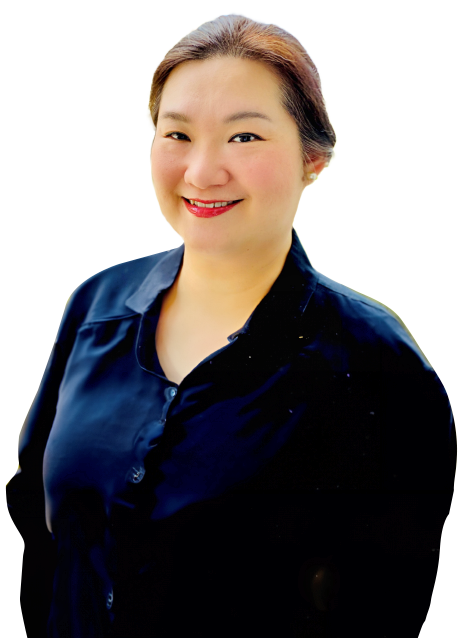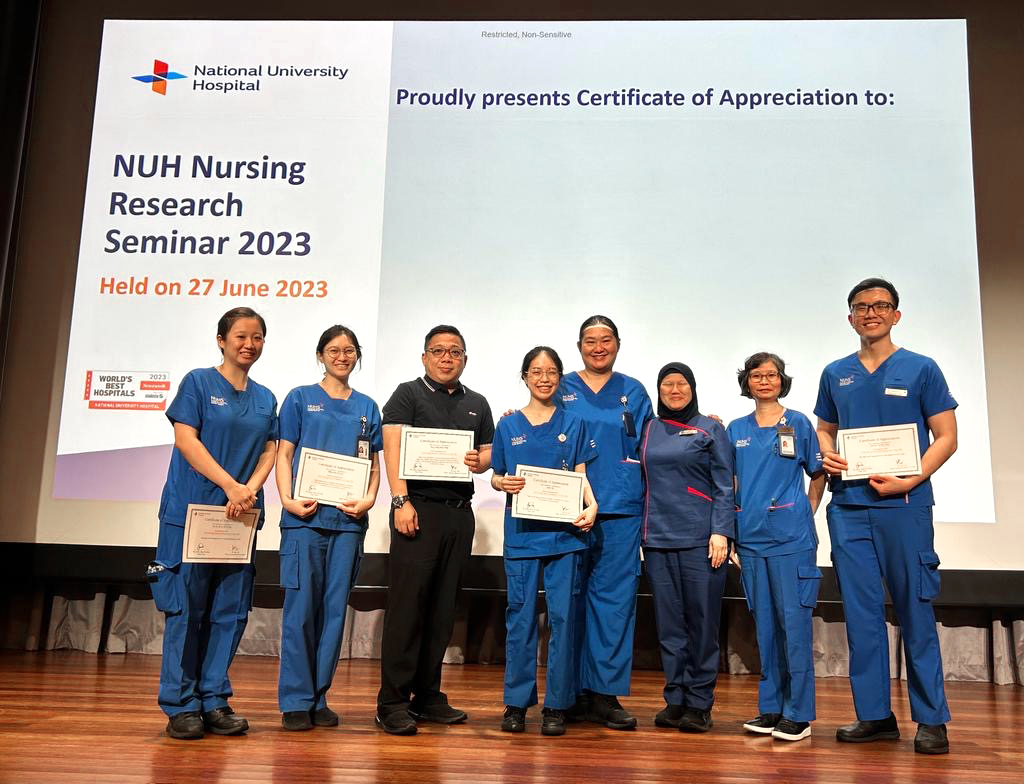
Taking over the helm as National University Hospital (NUH)’s Chief Nurse in January 2024, Dr Karen Koh successfully balances multiple roles of Nursing leader, wife and mother.
A 20 plus year Nursing veteran, Dr Koh began her Nursing career in the NUH general wards before moving on to the Coronary Care Unit and Intensive Care Units, and then becoming Head of Nursing at National University Heart Centre, Singapore (NUHCS) from 2018 to 2020. Along the way, she has nurtured and mentored many nurse leaders. She has also helped numerous nurse educators and nurse clinicians sharpen their Nursing acumen.
Outside work, the mother of 2 is a baking enthusiast who once contemplated hanging up her Nursing scrubs in exchange for a professional baking apron! Thankfully, her passion for Nursing won out.
Advice 1: Sometimes the wrong choices bring us to the right places.
A career in healthcare was not something she had considered. “After my GCE A-Levels, I applied and got into the then School of Biological Sciences at the Faculty of Science, National University of Singapore (NUS). I totally hated it—and told my parents that I wanted to quit school. They felt blindsided because I was on the Dean’s list—and to make it worse, I didn’t know what I wanted to do.”
As sure as Dr Koh was about not wanting to be a microbiologist, she knew she wanted a job that involved working with people. But there was one problem—she had no clue if she should go into Nursing or teaching. “After speaking to my friend’s mother who was a nurse and her aunt who was a teacher, I decided to give teaching a try. But as it turned out, I cannot choose the subjects I want to teach—so I settled on Nursing. And here we are—after one big round—and as they say, the rest is history,” she said. “After all these years, I still find Nursing interesting because it offers so many possibilities and roles for one to explore.”
Advice 2: An open mind opens doors.
Sharing her journey, Dr Koh elaborated, “Take me for example, I have experience as a clinical nurse. But I also have experience in management, education and research. There are just so many opportunities in Nursing—and if you are naturally curious and keen to explore, Nursing is a good profession that offers many different experiences.”
Indeed, Dr Koh had journeyed through different specialties and a variety of portfolios over the course of her career. She said, “I was trained in paediatrics for my honours—so that was naturally my first choice for specialisation. But in the end, I got my second choice—neurosurgery. During my stint there, which I totally enjoyed, I had first-hand encounters at the Intensive Care Unit (ICU) when dropping off patients for their after-surgery recovery. One thing led to another, I fell in love with ICU. I did a rotation there subsequently—which affirmed my decision to become an ICU Advanced Practice Nurse (APN).”
“If I weren’t open to trying something other than paediatrics, my Nursing career would have been very different today. So my advice for younger nurses is always to keep their minds and options open—and to just try. Because how else does one know whether a particular specialisation or career track is for them? Sometimes in the process of trying, a few closed doors may come up but there are always going to be other open doors. Other times, the open doors may not have what you are looking for. If so, do not hesitate to close them—just like my closing of the science door when I realised that it was not a match for me,” Dr Koh recalled.
Advice 3: Learning to enjoy the learning process is key to learning.
Although she got off to a slower start in her Nursing education, she had certainly more than made up for it since. A firm believer in lifelong learning, Dr Koh took up the offer to pursue the Master of Science in Nursing (Acute Care Practitioner and Clinical Nurse Specialist) at the University of Pennsylvania (UPenn) when presented with an opportunity just 4 years into her Nursing career.
“The opportunity came up in 2004. I was still relatively junior then—and also newly married—but I said ‘yes’ anyway,” she said. Dr Koh completed her course in less than 18 months and became one of the pioneer APNs with collaborative prescribing rights in Singapore. She continues to be active in the development of APNs both at the National University Hospital and nationally.
In 2018, Dr Koh returned to school again when she decided to do a PhD in Nursing with Alice Lee Centre of Nursing Studies (NUS Nursing), National University of Singapore Yong Loo Lin School of Medicine in 2018. This time around, Dr Koh was already a mother of 2—and doing the studies part-time also meant that she had to balance work, family and school. She remembered, “It was definitely challenging. But I was very clear about my goal—that kept me going. I also made sure that I took time to appreciate the learning process.
“Truth is—if I wanted an easier way out, I could have taken the Doctorate of Nursing Practice (DNP) programme at UPenn. I would have completed the course and gotten my doctorate title within a year. But I was looking for a programme that was rigorous and could push me out of my comfort zone to think creatively. I am happy I persisted because while my research capabilities were previously adequate, I am now much more proficient and systematic in data collection or analysis.”
Dr Koh added as an afterthought, “My husband would sometimes laugh at me—saying that my real profession is actually extended studenthood.”
Advice 4: Think big because we become who we think we are.
Dr Koh believes that nurses in Singapore, especially the APNs, are well trained and equipped to do more. She explained, “We place great emphasis on the APNs and their training because we see an opportunity for them to advance Nursing and improve population health. For that to happen however, 2 things must change.
“First, we need to boost their confidence level—both in themselves and in what they can achieve. This starts from the moment they enter the APN programme. An important lesson from my experience at UPenn is that we may be students—but we are also professional nurses. That shifted the mindset—from that of a helpless student to a knowledgeable professional, empowered to act in the best interest of patients. This same concept should be adapted in our APN programme—and further reinforced in clinical settings—so that APNs have the confidence to provide frontline care instead of relying on doctors’ cues all the time.”
Dr Koh continued, “Another aspect where APNs can contribute is the adoption of innovative healthcare. Confronting an ageing population, we need to be creative in the way we think about healthcare and how we deliver patient care. Can we leverage technology to help patients better manage their health? Or how else can we engage patients and their caregivers so that they can take better ownership of their health? Being close to the ground with a good understanding of patients’ abilities and their dynamics with caregivers, APNs are in the best position to devise patient management and implementation strategies.”
Advice 5: No journey is better than the other—we all have our own pace and trajectory.
Dr Koh’s Nursing career is a unique one. She said, “I have never regretted my decision to become a nurse but I recognise that my journey is not similar for everyone. That is why I would always encourage young nurses to think through what they are looking at in the long term, then talk to people to better understand how their journey should look like—and the skills they need to develop to get there. Depending on their aspirations, each nurse’s journey could look very different.”
“Nurses in Singapore are very fortunate because there is a clear competency framework as well as structure and funding mechanisms in place. Additionally, healthcare organisations are also increasingly prioritising the continuous development of their Nursing workforce. So there are opportunities that are readily accessible and available,” Dr Koh said. “But most importantly, everyone has a different trajectory and pace—so no one can assess when and what is the best time and way to go about it other than the person himself or herself.”

Dr Koh is pictured third from left in her old uniform (left picture) and fifth from left in her new uniform (right picture), alongside her NUH colleagues.
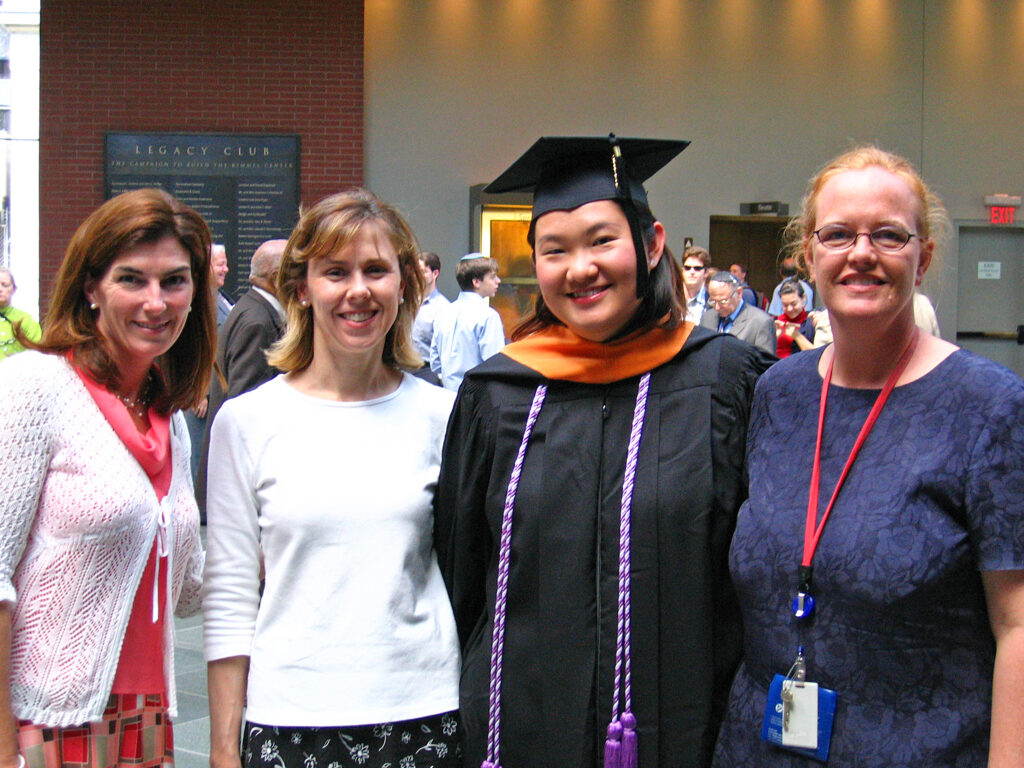
Dr Koh with her UPenn lecturers.
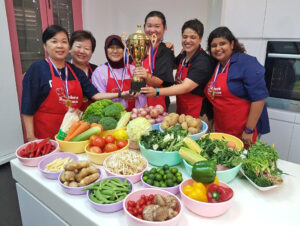
Dr Koh at a cooking team building event with nurse leaders.
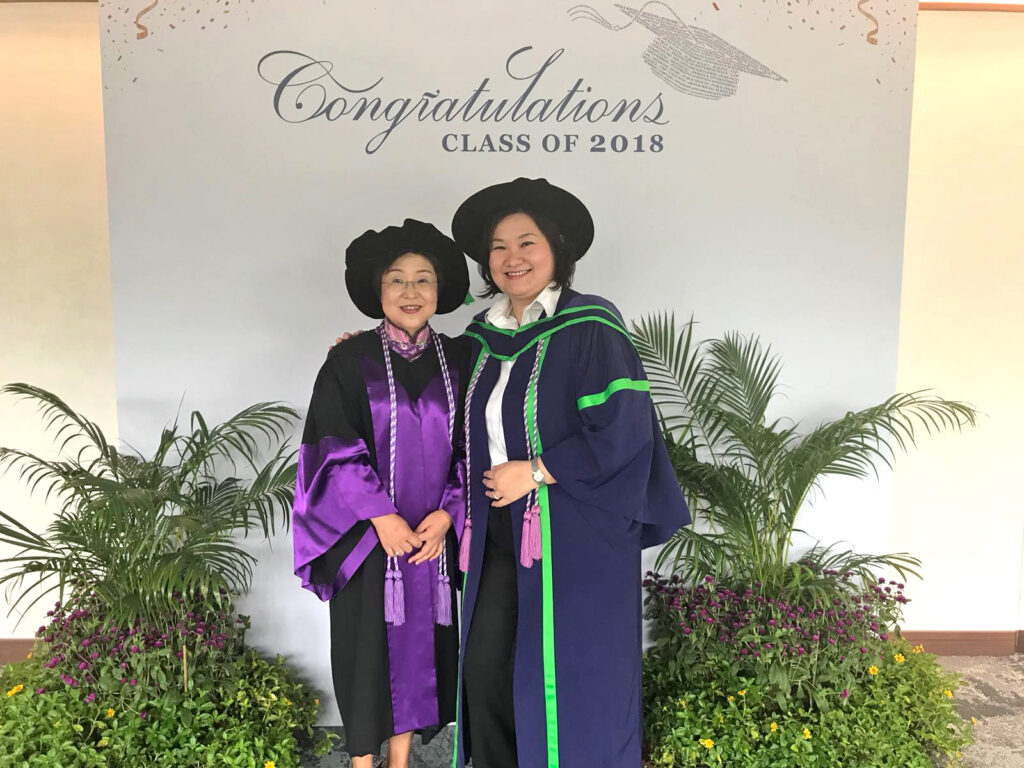
Dr Koh sharing a moment with her PhD supervisor, Prof Wang Wenru, at the convocation ceremony.


